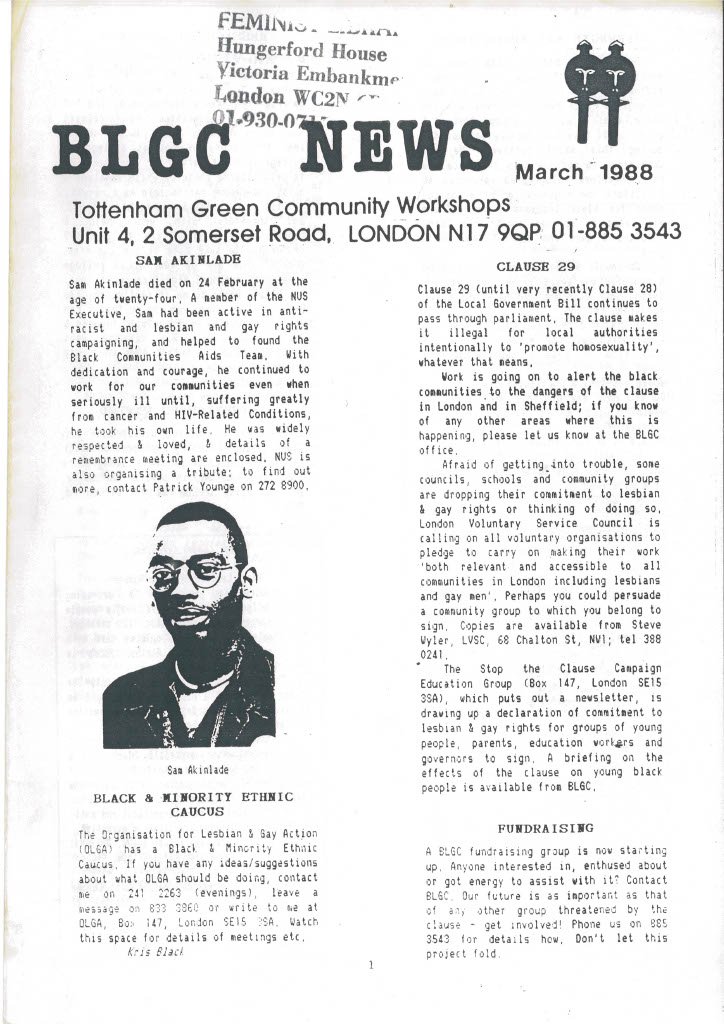
Black Lesbian and Gay Centre
‐
Founded by the Gay Black Group in 1985 to support LGBTQIA+ racialized minority communities in London
Location(s)
2 Somerset Road, London, N17 9QP
Black Lesbian and Gay CentreBM Box 4390
Peckham, London
WC1N 3XX
United Kingdom
About
In the early 1980s, racialized minority LGBTQIA+ people in London would meet regularly to discuss their issues, seek counsel and socialize. This became the Gay Black Group, which advocated for a permanent community centre. They turned to Greater London Council (GLC) and requested funding for the Black Lesbian and Gay Centre (BLGC). This came to fruition in 1985, three years after their initial request, when the GLC granted the Gay Black Group funding to create the BLGC and find a permanent location.
The funding was used to pay four part-time workers, including Savitri Hensman. The BLGC found temporary premises in north London, where it held events such as weekly support groups, art shows, discos, film screenings and Q&As on topics like health and housing. In March 1986 BLGC hosted a conference with the GLC Ethnic Minorities Unit. The theme of the conference was ‘challenging heterosexism in our community’. In April 1986 the BLGC began publishing their quarterly magazine, Blackout. It also regularly published newsletters which contained news of events hosted by related organizations across the UK and upcoming conferences. This included advertising the Smash the Backlash demonstration in its April 1987 newsletter, which was the first LGBTQIA+ rights and anti-racism march in Britain. Funding became a regular point of concern for the BLGC after the dissolvement of the GLC in 1986 under the new Local Government Act. The BLGC instead had to rely on the London Borough Grants Scheme as well as member donations.
In January 1988 the BLGC encouraged its members to write to their MPs about their opposition to Section 28 in the Local Government Bill 1988, which stated that local authorities were prohibited from promoting homosexuality through teaching, funding or published materials. The law came into effect in May 1988 and, for organizations which were supported by a local authority, there were concerns about whether their funding would continue. In response, the BLGC organized a ‘Black Lesbians and Gays Fight the Clause’ conference, where the attendees decided to set up a support group for those affected by Section 28.
In 1992 permanent premises for the BLGC were secured in Peckham. This was a prolonged process due to precarious funding and discriminatory landlords. Nonetheless, the establishment of a permanent base after a decade of campaigning resulted in the BLGC becoming the first Black lesbian and gay centre in Europe. Owing to limited resources, however, the BLGC could no longer pay for the workers it needed and its operations were under threat. The centre closed in 1995, although sporadic newsletters suggested that it continued its work through voluntary contributions to a limited extent until 2000. In 2024 a Rainbow plaque was unveiled in Peckham to mark the establishment of the BLGC.
Section 28 of Local Government Act 1988
Dennis Carney, Femi Otitoju, Dorothea Smartt.
GLC Ethnic Minorities Unit, Shakti.
Kheraj, Alim, Queer London: A Guide to the City’s LGBTQ+ Past and Present (London: ACC Arts Books, 2021)
McKenzie, Veronica, ‘The Black Lesbian and Gay Centre’, in Adam Furman and Joshua Mardell (eds) Queer Spaces: An Atlas of LGBTQ+ Places and Stories (London: RIBA Press, 2022), pp. 68–9
Murphy, Gillian, ‘"Our own space" – the Black Lesbian and Gay Centre', LSE Library (31 October 2016), https://blogs.lse.ac.uk/lsehistory/2016/10/31/theblacklesbianandgaycentre/
BLGC Newsletters 1987-2000, LGBTQIA+ Online Archive, Bishopsgate Institute, https://www.bishopsgate.org.uk/collections/black-lesbian-and-gay-centre
BLGC Ephemera, LGBTQIA+ Online Archive, Bishopsgate Institute, https://www.bishopsgate.org.uk/collections/black-lesbian-and-gay-centre
Savi Hensman Oral History, Haringey Vanguard, Haringey Archives and Museums, https://www.hqbh.co.uk/night-life/savi-hensman/

March 1988 Newsletter, Black Lesbian and Gay Centre, LGBTQ+ Archives. Courtesy of the Bishopsgate Institute.
Image credit
© Remaking Britain: South Asian Connections and Networks, 1930s – present
